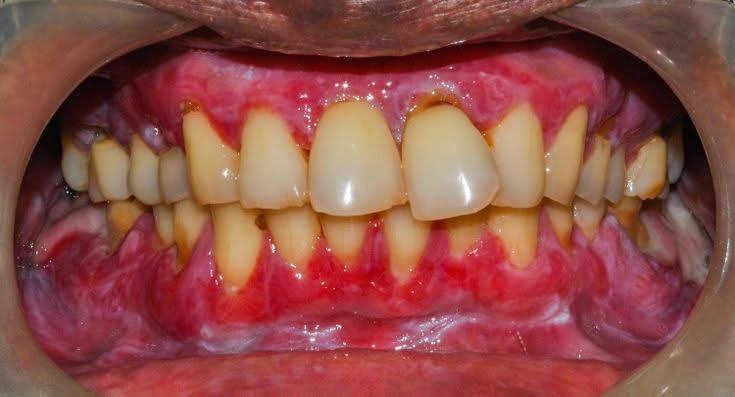Table of Contents
Introduction
Do you ever feel like your mouth is burning? Maybe eating spicy food or even just enjoying a meal becomes hard? If that’s true for you, it might be a condition called oral lichen planus. This happens mostly in the mouth and is one of the first signs of lichen planus.
What is Lichen Planus?
Lichen planus is a condition where the body’s immune system causes swelling and irritation in certain parts, like the skin and inside the mouth. Nearly 5 out of 100 adults face this, mostly women, and it usually starts when people are middle-aged.
For many with lichen planus, about 77%, it affects the mouth. The most common place is the inside of the cheeks. Some people don’t feel anything, but others might have pain. Eating certain foods, like spicy or acidic ones, can be tough. Even brushing your teeth might hurt.
Understanding Oral Lichen Planus
One thing to be aware of is that although lichen planus itself isn’t harmful, a tiny percentage of cases, around 1 or 2 out of 100, might turn into something more serious within 7 years. This happens when the lesions or sores in the mouth change in a bad way. Some things that can make this more likely are if the lesions are on the tongue or if you’re a woman.
Sometimes, the way lichen planus looks can be a bit like other more serious conditions. For example, there are different types of lichen planus. Some might look a lot like other conditions that could turn into cancer. It’s crucial to get the right diagnosis to be safe.
Take the first step to a better Oral health!
Get tips on Oral health and discover ways to improve your Dental health. Sign up today
Diagnosis and Treatment
Doctors usually recognize lichen planus by how it looks. But sometimes, they might need to take a small piece of the affected area to make sure it’s lichen planus and not something worse.
The good news is that if the lesions or sores aren’t causing trouble, they might not need treatment. But checking them regularly is important to ensure they’re not changing. Keeping the mouth clean and avoiding rough foods can help those who feel discomfort. If the symptoms are big and long-lasting, doctors might suggest using special creams or, in some cases, medicines to make things better.
Do I have lichen planus?
Discover the cause with this simple questionnaire. Check all the boxes that apply to you.
Oral Lichen Planus Self-Test Questionnaire
Seeking Medical Advice
Remember, if you ever feel something strange in your mouth, especially if it burns or hurts when eating, it’s good to see a doctor. It might just be something small, but it’s always smart to get it checked to stay healthy and happy.
For more detailed information, you can refer to the following sources:
- WebMD – Oral Lichen Planus: Symptoms, Causes, and Treatments
- Healthline – Oral Lichen Planus: Symptoms, Causes, and Treatment
By staying informed and seeking timely medical advice, you can ensure the best possible care for your oral health.
FAQ
What is oral lichen planus?
Oral lichen planus is a condition where the immune system causes inflammation, leading to lesions or sores in the mouth. It can cause discomfort and a burning sensation for some people.
Who is more likely to get oral lichen planus?
It is more commonly found in adults, especially middle-aged individuals, with a higher occurrence in females. Approximately 5 out of 100 adults might face this condition.
What are the symptoms of oral lichen planus?
Symptoms can vary. Some people might not feel any discomfort, while others might experience pain and find it difficult to eat certain foods, especially spicy or acidic ones.
Can oral lichen planus become something serious?
Although it’s mostly harmless, in a small percentage of cases (around 1-2 out of 100), the lesions might turn into a more severe condition within 7 years. This is why monitoring is essential.
How is oral lichen planus diagnosed?
Doctors usually recognize it by the appearance in the mouth. Sometimes, they might need to take a small piece of the affected area for further tests to confirm the diagnosis.
Is treatment necessary for oral lichen planus?
Treatment might not be needed if the lesions are not causing any trouble. However, for those experiencing discomfort, maintaining oral hygiene, avoiding irritating foods, and, in some cases, using special creams or medicines can help manage symptoms.
Can oral lichen planus lead to cancer?
While most cases don’t lead to cancer, a small percentage might undergo malignant transformation. Factors like ulceration and location within the mouth might increase this risk.
What should I do if I suspect I have oral lichen planus?
If you’re experiencing any discomfort, burning sensation, or unusual changes in your mouth, it’s crucial to consult a dental professional.
Citations:
[1] https://www.webmd.com/oral-health/oral-lichen-planus
[2] https://silverhilldental.com/oral-lichen-planus-and-the-burning-mouth-syndrome/
[3] https://www.healthline.com/health/oral-lichen-planus
[4] https://www.ncbi.nlm.nih.gov/pmc/articles/PMC7648912/
[5] https://www.youtube.com/watch?v=fwr9wzVWUJ0
- Steiner’s Cephalometric Analysis – Free cephalometric analysis - June 7, 2025
- COGS CEPHALOMETRIC ANALYSIS – FREE TO USE - June 7, 2025
- Can You Eat on Root Canal Treated Teeth? Everything You Need to Know - May 18, 2025


